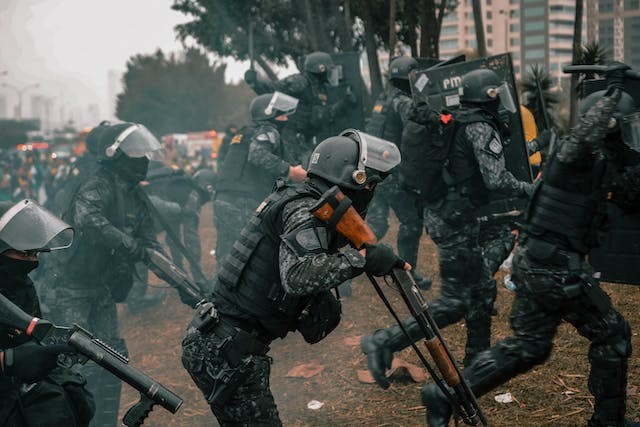
As the battle between Israel and Palestinian militants waxes on, an escalating civilian death toll brings an urgent question to the fore: What war crime laws apply to the Israel-Palestinian conflict? The conflict, which erupted following the cross-border attack by Gaza's ruling Islamist group Hamas on Oct 7, is now under the scrutiny of complex international justice systems developed since World War Two, primarily aimed at protecting civilians. Irrespective of claims of self-defense, international regulations regarding armed conflict equally apply to all war participants.
An Overview of Conflict Laws
All ratified by the United Nations member states and accepted universally are battle regulations derived from the 1949 Geneva Conventions. These core principles, expanded and reinforced through international war crimes tribunals' judgments, constitute a collective legal framework known as the "Law of Armed Conflict" or "International Humanitarian Law." By definition, these regulations govern how civilians, soldiers, and prisoners of war are to be treated, applying to both government forces and organized, non-state armed groups like Hamas militants.
Are Hospitals Viable Military Targets?
Criticism has privately mounted over Israel's alleged targeting of medical facilities, including the main Al Shifa hospital in Gaza City. Israel accuses Hamas of establishing command and control centers underneath these facilities as a safeguard against air raids, a claim contested by Hamas. According to a World Health Organization report dated Nov 15, 152 attacks on health structures in Gaza have been verified.
Balancing Military Necessity and Humanity
Reflecting on recent jurisprudence related to hospital attacks during the conflicts in Yugoslavia, Carolyn Edgerton, a Canadian lawyer, highlights the necessity of striking a balance between military needs and humanity. Edgerton underscores that the first Geneva Convention strictly prohibits attacks on hospitals and extends protection to the wounded, sick, medical staff, and ambulances. However, protection ceases if these establishments commit acts harmful to the enemy party.
Ascertaining if a hospital's protection is compromised involves an evidence-based investigation. Even if a facility is deemed militarily significant, Israel must consider whether the anticipated collateral damage outweighs the military benefit.
ALSO READ: Lawmakers demand president resigns as Afghan battle rages
Which Acts Could Breach War Crimes Law?
According to Human Rights Watch, potential war crimes may include Hamas's deliberate civilian targeting, indiscriminate rocket attacks, taking civilians as hostages, and the death of over 11,000 Palestinians, including thousands of children, from Israeli counter-strikes in Gaza. The universally recognized Geneva Conventions explicitly forbid hostage-taking, murder, and torture. Moreover, Israel's reaction could also be subjected to a war crimes probe.
What Do The Geneva Conventions Dictate?
The Geneva Conventions primarily aim to shield civilians during wars. Under these laws, combatants include members of state armed forces, volunteer forces, and non-state armed groups. Direct attacks on civilians or civilian objects are strictly forbidden. Furthermore, any intentional attack on humanitarian aid personnel and related material is a distinct war crime, assuming those providing aid are civilians.
Which Institutions Can Prosecute War Crimes?
Primarily, war crimes should be tackled by local jurisdictions - in this case, courts in Israel and the Palestinian Territories. The International Criminal Court (ICC) in The Hague also possesses legal authority to investigate and charge on these issues, especially when domestic entities appear 'unwilling or unable' to do so.
What Does International Law State About Human Shields?
Israel blames Hamas for the civilian deaths, alleging that it has been using Palestinians in Gaza as human shields and concealing command centers and arms in hospitals and residential areas. International humanitarian law strictly disallows the use of human shields - considering it a grave violation of the Geneva Conventions.
In short, solving the Israel-Palestinian conflict's war crimes riddle requires a nuanced understanding of International Humanitarian Law guided by a trusted legal voice. Need expert legal help to navigate through the complexities? Contact our team of experienced legal professionals who can provide comprehensive assistance and advice. We can ensure you get the right help exactly when needed.
RELATED TOPIC:Four Ways An Attorney Can Help You




